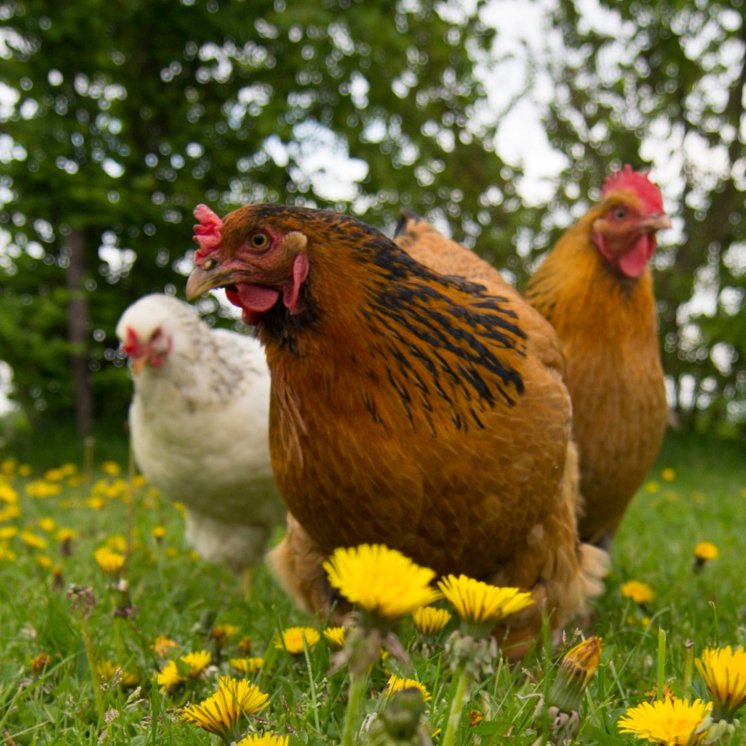Welcome to our backyard flock vaccine club!
We’re introducing our backyard flock vaccine club to make it as easy as possible to keep your birds protected from illnesses and viruses.
We buy vaccines in bulk and package them into single doses, ready for you to administer to your poultry at home – usually as eye drops, but sometimes as injections.
All you need to do is let us know how many doses you need in advance. Then on the day, pick them up from our Kirriemuir branch – just remember, you’ll need to administer the vaccine within two hours of collection, so make sure you’re prepared!
Our next vaccination date is 10th May, and you can read more below about why vaccinating your birds is so important.
If you’d like to sign up to receive vaccinations from us, please fill out the registration form below.
Register here:
Why should you vaccinate your poultry?
Viruses and bacteria are present in the environment and at some point in their lifetime your poultry may come into contact with something that makes them, or even you, poorly.
We want you and your animals to be as healthy as possible and vaccines play an important role in achieving this.
Antibiotics are ineffective against viruses and can only help bacterial infections or secondary bacterial infections in weakened birds, meaning we need a different approach to prevent disease from viruses.
Vaccines provide a level of immunity to a disease that will help your birds stay healthier and reduce potential transmission to your other poultry or to you.

What should you vaccinate for?
There are many viruses and bacteria that can infect poultry. Below, we have highlighted the ones that we see most frequently, or that pose the greatest risk if infection occurs.
Infectious bronchitis
This is a disease caused by a type of coronavirus, of which there are many strains present in the UK. This means we have to use different vaccines to provide protection against the most common strains. It is typically caused by airborne transmission and can cause respiratory distress, pus from the nasal cavities, reduced egg production and poor eggshell quality. Damage caused to the oviduct can predispose hens to subsequent egg peritonitis infections.
Mycoplasma
This is a family of bacteria that cause a variety of different diseases which can be transmitted to poultry by infected clothing, footwear and equipment as well as from bird to bird, and through the egg from parent to chick. Mycoplasma is often found in wild bird populations. These bacteria can cause respiratory signs such as swelling of the respiratory tract, or swelling of the leg and wing joints.
Newcastle disease
It is a legal requirement that you notify Defra if it is suspected one of your birds has Newcastle disease. There is only one strain currently found in the UK, but it can cause a range of symptoms, from mild to severe. It is typically spread through the infected faeces of wild or domestic birds but also through respiratory discharge of infected birds, as well as through contaminated clothing and equipment. It can cause very high death rates at its worst, as well as paralysis, depression, diarrhoea and respiratory distress.
Avian rhinotracheitis
This is easily transmitted from bird to bird, as well as through contaminated clothing, footwear, equipment or drinking water. It commonly affects turkeys and chickens, and can cause breathing difficulties, swollen heads and sinuses, nasal discharge, sneezing and sometimes a reduction in egg production.
Ornthobacterium rhinotracheale infection
This is caused by bacteria spread from bird to bird, through clothing or equipment, or from parent to chick through the egg. It can affect chickens and turkeys, and typically causes respiratory illness such as swollen sinuses and watery eyes, but can also cause swollen joints.
Salmonella
There are thousands of salmonella variants, but we are mainly concerned with two types which can infect humans through food and cause severe food poisoning. The poultry themselves will typically show no ill health and only carry the disease, having picked it up from mice, rats, livestock or wild birds.
How to vaccinate
Both methods described below require the vaccine to be administered within two hours of collection. It is advisable to have your birds penned prior to collection so that you can catch them quickly once you get home.
